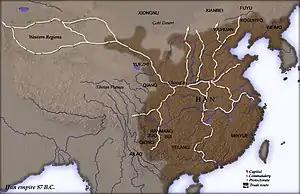87 BC
Year 87 BC was a year of the pre-Julian Roman calendar. At the time it was known as the Year of the Consulship of Octavius and Cinna/Merula (or, less frequently, year 667 Ab urbe condita) and the Second Year of Houyuan. The denomination 87 BC for this year has been used since the early medieval period, when the Anno Domini calendar era became the prevalent method in Europe for naming years.
| Millennium: | 1st millennium BC |
|---|---|
| Centuries: | |
| Decades: | |
| Years: |
| 87 BC by topic |
| Politics |
|---|
|
| Categories |
|
| Gregorian calendar | 87 BC LXXXVI BC |
| Ab urbe condita | 667 |
| Ancient Egypt era | XXXIII dynasty, 237 |
| - Pharaoh | Ptolemy IX Lathyros, 2 |
| Ancient Greek era | 173rd Olympiad, year 2 |
| Assyrian calendar | 4664 |
| Balinese saka calendar | N/A |
| Bengali calendar | −679 |
| Berber calendar | 864 |
| Buddhist calendar | 458 |
| Burmese calendar | −724 |
| Byzantine calendar | 5422–5423 |
| Chinese calendar | 癸巳年 (Water Snake) 2610 or 2550 — to — 甲午年 (Wood Horse) 2611 or 2551 |
| Coptic calendar | −370 – −369 |
| Discordian calendar | 1080 |
| Ethiopian calendar | −94 – −93 |
| Hebrew calendar | 3674–3675 |
| Hindu calendars | |
| - Vikram Samvat | −30 – −29 |
| - Shaka Samvat | N/A |
| - Kali Yuga | 3014–3015 |
| Holocene calendar | 9914 |
| Iranian calendar | 708 BP – 707 BP |
| Islamic calendar | 730 BH – 729 BH |
| Javanese calendar | N/A |
| Julian calendar | N/A |
| Korean calendar | 2247 |
| Minguo calendar | 1998 before ROC 民前1998年 |
| Nanakshahi calendar | −1554 |
| Seleucid era | 225/226 AG |
| Thai solar calendar | 456–457 |
| Tibetan calendar | 阴水蛇年 (female Water-Snake) 40 or −341 or −1113 — to — 阳木马年 (male Wood-Horse) 41 or −340 or −1112 |

The Han Dynasty in 87 BC (provinces in brown)
Events
Roman Republic
- Lucius Cornelius Cinna is elected consul of Rome, thus returning the rule of Rome back to the populares faction.
- Sulla arrives in Greece and besieges Athens. He orders Lucius Licinius Lucullus to raise a fleet from Rome's allies around the eastern Mediterranean.
- Ostia is razed by Gaius Marius as he comes back from Africa with an army to take Rome by force.
China
- March 29 – Emperor Wu of Han dies after a 54-year reign in which he leads the Han dynasty (China) through its greatest expansion. The Empire's borders span from modern Kyrgyzstan in the west, to Mongolia in the north, to Korea in the east, and to northern Vietnam in the south.
- March 30 – The eight-year-old Liu Fuling becomes emperor, with Huo Guang General-in-Chief and regent.[1]
Technology
- Antikythera mechanism manufactured.
Births
- Lucius Munatius Plancus, Roman consul (approximate date)
Deaths
- March 29 – Han Wudi, emperor of the Han dynasty (b. 157 BC)
- Apollodorus of Artemita, Greek writer
- Gaius Atilius Serranus, Roman consul and senator
- Gaius Julius Caesar Strabo, Roman politician
- Gnaeus Pompeius Strabo, Roman general and politician
- Gotarzes I, ruler (shah) of the Parthian Empire
- Lucius Cornelius Merula, Roman politician and priest
- Lucius Julius Caesar, Roman consul (killed by partisans of Gaius Marius)
- Marcus Antonius, Roman consul (executed by order of Marius and Cinna)
- Publius Licinius Crassus, Roman consul and censor (killed by Marians invading Rome)
- Quintus Ancharius, Roman politician (executed by order of Marius and Cinna)
References
- Hung, Hing Ming (2020). The Magnificent Emperor Wu: China's Han Dynasty. p. 239. ISBN 978-1628944167.
This article is issued from Wikipedia. The text is licensed under Creative Commons - Attribution - Sharealike. Additional terms may apply for the media files.